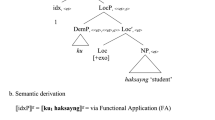Abstract
This paper presents an analysis of the interaction ofwh-phrases and negation in Korean. We observe that a wh-phrasemust not be c-commanded by negative polarity item. This isrelated to the observation that in German, a wh-phrase must notbe c-commanded by negation or a negative quantifier. We suggestthat both languages are sensitive to a restriction that prohibitsLF movement across negation, the Minimal Negative StructureConstraint MNSC, proposed in Beck (1996). Since a negativepolarity item must always be in the scope of negation, the MNSCcovers the Korean data as well as the German facts. Our analysishas several interesting implications for LF structures in Korean.One is that negation cannot be interpreted in its S-structureposition. Another concerns the semantic effect of scrambling.Contra Saito (1989, 1992), we argue that scrambling serves toidentify intended relative scope and is thus by no means vacuous.We propose that short scrambling is never reconstructed.
Similar content being viewed by others
REFERENCES
Abusch, Dorit (1994) “The Scope of Indefinites,” Natural Language Semantics2, 83–135.
Ahn, Hee-Don and Hang-Jin Yoon (1989) “Functional Categories in Korean,” in Susumu Kuno, Ik-Hwan Lee, John Whitman, Sung-Yun Bak, Young-Se Kang, and Young-joo Kim (eds.), Harvard Studies in Korean LinguisticsIII, Hanshin Publishing Company, Seoul, pp. 79–88.
Beck, Sigrid (1995) “Negative Islands and Reconstruction,” in Uli Lutz and Jürgen Pafel (eds.), Extraction and Extraposition in German, Benjamins, Amsterdam, pp. 121–143.
Beck, Sigrid (1996) “Quantified Structures as Barriers for LF Movement,” Natural Language Semantics4, 1–56.
Beck, Sigrid (1996a) Wh-Constructions and Transparent Logical Form, PhD dissertation, Universität Tübingen.
Cho, Young-mee Yu and Peter Sells (1995) “A Lexical Account of Inflectional Suffixes in Korean,” Journal of East Asian Linguistics4.2, 119–174.
Cresti, Diana (1995) “Extraction and Reconstruction,” Natural Language Semantics3, 79–122.
Diesing, Molly (1992) “Bare Plural Subjects and the Derivation of Logical Representations,” Linguistic Inquiry23, 353–380.
Hamblin, C. L. (1973) “Questions in Montague English,” Foundations of Language10, 41–53.
Han, Hak-Sung (1987) The Configurational Structure of the Korean Language, PhD dissertation, University of Texas at Austin.
Heim, Irene and Angelika Kratzer (1991) Introduction to Semantics, ms., MIT and University of Massachusetts, Amherst.
Heycock, Caroline and Young-Suk Lee (1989) “Subjects and Predication in Korean and Japanese,” in Hajime Hoji (ed.), Japanese/Korean Linguistics, CSLI, Stanford, pp. 239–254.
Hoji, Hajime (1985) Logical Form Constraints and Configurational Structures in Japanese, PhD dissertation, University of Massachusetts, Amherst.
Hoji, Hajime (1986) “Scope Interpretation in Japanese and Its Theoretical Implications,” in Proceedings of the 5th West Coast Conference on Formal Linguistics, pp. 87–101.
Kang, Myung-Yoon (1988) Topics in Korean Syntax: Phrase Structure, Variable Binding and Movement, PhD dissertation, MIT.
Karttunen, Lauri (1977) “Syntax and Semantics of Questions,” Linguistics and Philosophy 1, 3–44.
Kroch, Anthony (1989) “Amount Quantification, Referentiality and Long Wh-Movement,” ms., University of Pennsylvania.
Ladusaw, William (1979) Polarity Sensitivity as Inherent Scope Relations, PhD dissertation, University of Texas at Austin.
Lee, Young-Suk (1990) “Is INFL Universal? A Case Study of Korean,” in Proceedings of ESCOL 7, 204–214.
Lukoff, Fred (1982) An Introductory Course in Korean, Yonsei University Press, Seoul.
Pesetsky, David (1989) “Language-Particular Processes and the Earliness Principle,” ms., MIT.
Rizzi, Luigi (1990) Relativized Minimality, MIT Press, Cambridge, Massachusetts.
Ross, J. R. (1984) “Inner Islands,” in Proceedings of the 10th Meeting of the Berkeley Linguistics Society, 258–265.
Rullmann, Hotze (1995) Maximality in the Semantics of WH-Constructions, PhD dissertation, University of Massachusetts, Amherst.
Saito, Mamoru (1989) "Scrambling as Semantically Vacuous A'-Movement,"; in Mark Baltin and Anthony Kroch (eds.), Alternative Conceptions of Phrase Structure, University of Chicago Press, Chicago, pp. 182–200.
Saito, Mamoru (1992) “Long Distance Scrambling in Japanese,” Journal of East Asian Linguistics, 1, 69–118.
Saito, Mamoru (1994) “Scrambling and the Functional Interpretation of WH-Phrases,” ms., University of Connecticut.
Sells, Peter (1995) “Korean and Japanese Morphology from a Lexical Perspective,” Linguistic Inquiry26, 277–325.
Stechow, Arnim von (1993a) “Die Aufgaben der Syntax,” in Joachim Jacobs, Arnim von Stechow, Wolfgang Sternefeld, and Theo Vennemann (eds.), Syntax. Ein internationales Handbuch der zeitgenössischen Forschung, de Gruyter, Berlin, pp. 1–88.
Stechow, Arnim von (1993b) “Rekursive Konstruktion der Fragebedeutung,” ms., Universität Tübingen.
Stechow, Arnim von and Wolfgang Sternefeld (1988) Bausteine syntaktischen Wissens, Westdeutscher Verlag, Opladen.
Sternefeld, Wolfgang (1995) “Reciprocity and Cumulative Predication,” to appear in Fritz Hamm and Erhard Hinrichs (eds.), Plurality and Quantification, Kluwer Academic Publishers, Dordrecht.
Suh, Jinhee (1990) Scope Phenomena and Aspects of Korean Syntax, PhD dissertation, University of Southern California.
Szabolsci, Anna and Frans Zwarts (1993) “Weak Islands and an Algebraic Semantics for Scope Taking,” Natural Language Semantics1, 235–284.
Whitman, John (1989) “Topic, Modality, and IP Structure,” in Susumu Kuno, Ik-Hwan Lee, John Whitman, Sung-Yun Bak, Young-Se Kang, and Young-joo Kim (eds.), Harvard Studies in Korean LinguisticsIII, Hanshin Publishing Company, Seoul, pp. 341–356.
Author information
Authors and Affiliations
Rights and permissions
About this article
Cite this article
Beck, S., Kim, SS. On wh- and Operator Scope in Korean. Journal of East Asian Linguistics 6, 339–384 (1997). https://doi.org/10.1023/A:1008280026102
Issue Date:
DOI: https://doi.org/10.1023/A:1008280026102



